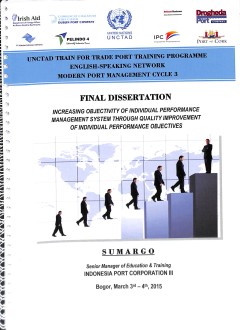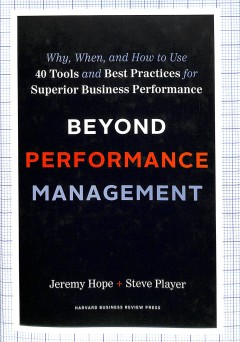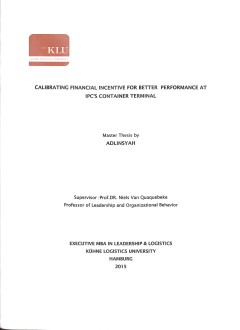Ditapis dengan

Key performance indicators : the 75 measures every manager needs to know
By identifying and describing the most powerful financial and non-financial KPIs, this book will make life easier for you by defining them, explaining how and when they should be used and providing a rich library of KPIs that have been proven to significantly improve performance.
The book presents case examples to illustrate t…
- Edisi
- -
- ISBN/ISSN
- 978-0-273-75011-6
- Deskripsi Fisik
- xxviii, 347 p., ; illus : 24 cm ; index
- Judul Seri
- -
- No. Panggil
- 658.4013 MAR k

Modelling project management performance
- Edisi
- Vol. 20 Iss 2
- ISBN/ISSN
- 0265-671X
- Deskripsi Fisik
- 28 p .
- Judul Seri
- International Journal of Quality & Reliability Management
- No. Panggil
- ATC MG BRY m
- Edisi
- Vol. 20 Iss 2
- ISBN/ISSN
- 0265-671X
- Deskripsi Fisik
- 28 p .
- Judul Seri
- International Journal of Quality & Reliability Management
- No. Panggil
- ATC MG BRY m

Increasing objectivity of individual performance management system through qu…
- Edisi
- -
- ISBN/ISSN
- -
- Deskripsi Fisik
- 23 p., ; 33 cm
- Judul Seri
- Final Dissertation
- No. Panggil
- TD MG SUM i
- Edisi
- -
- ISBN/ISSN
- -
- Deskripsi Fisik
- 23 p., ; 33 cm
- Judul Seri
- Final Dissertation
- No. Panggil
- TD MG SUM i

Jumping the S-Curve : how to beat the growth cycle, get on top, and stay there
Recently, some bestselling management books have focused on providing a recipe for greatness, while others have sought to unlock the secrets of long-term success. But a detailed analysis at the intersection of the two, one that explains how some companies manage to achieve repeated peaks of business performance, has been missing — until now. Accenture’s Paul Nunes and Tim Breene have found …
- Edisi
- -
- ISBN/ISSN
- 978-1-4221-7558-3
- Deskripsi Fisik
- v, 270 p., ; illus : 24 cm ; index
- Judul Seri
- -
- No. Panggil
- LC 658.4012 NUN j

Full engagement! : inspire, motivate, and bring out the best in your people
In these tough economic times, everyone is expected to produce more with less. And yet, studies have shown that on average, employees are working at only a fraction of their potential. What are managers to do? How can they inspire their people to perform at their absolute best? Whatever the situation, a good manager can quickly organize a group of average performers into a high-functioning team…
- Edisi
- -
- ISBN/ISSN
- 978-0-8144-1689-1
- Deskripsi Fisik
- viii, 226 p., 26 cm
- Judul Seri
- -
- No. Panggil
- LC 658.314 TRA f

Beyond performance management : Why, When, and How to Use 40 Tools and Best P…
There’s a bewildering array of management tools out there. And they all promise to help you excel at the toughest parts of your job: defining your organization’s strategic direction, managing customers and costs, and boosting workforce performance.But just 30 percent of these tools deliver as intended. Why? As Jeremy Hope and Steve Player reveal in Beyond Performance Management, while many…
- Edisi
- -
- ISBN/ISSN
- 978-1-4221-4195-3
- Deskripsi Fisik
- 387 p., ; 28 cm ; index
- Judul Seri
- -
- No. Panggil
- LC 658.31 HOP b

Analytical model for performance measurement in healthcare sector of Punjab
The aim of this paper is to develop a model for analyzing the performance of health care service providers using analytical modeling.
- Edisi
- Vol. 10 No. 2, 2015
- ISBN/ISSN
- -
- Deskripsi Fisik
- 14 p.
- Judul Seri
- Journal of Modelling in Management
- No. Panggil
- ATC LO SIN a

A study into leadership and management competencies predicting superior perfo…
This paper aims to present a summary of a study to identify the competencies of effective leadership and management in the British Royal Navy (RN).
- Edisi
- -
- ISBN/ISSN
- -
- Deskripsi Fisik
- 29 p.
- Judul Seri
- -
- No. Panggil
- ATC LE DUL a

Advocacy to Promote Logistics in Humanitarian Aid
Purpose – This paper aims to examine some of the more effective means of advocacy focused on promoting the unique role of logistics in the delivery of much needed humanitarian aid, and outlines some of the challenges as experienced in the outcomes of recent disasters such as the Indian Ocean Tsunami 2004. Design/methodology/approach – The paper draws from the limited literature availabl…
- Edisi
- Vol. 32 Iss 11 pp.
- ISBN/ISSN
- 0140-9174
- Deskripsi Fisik
- 11 p
- Judul Seri
- Management Research News
- No. Panggil
- ATC LO WHI a

Cusum modelling of the dynamics of process performance improvement programmes
To evaluate the Cusum model as a means of rapid trend detection and dynamic response classifier in a low signal/noise environment.
- Edisi
- Vol. 55 No. 2, 2006 pp. 99-117
- ISBN/ISSN
- -
- Deskripsi Fisik
- 20 p.
- Judul Seri
- International Journal of Productivity and Performance Management
- No. Panggil
- ATC LO OWE c

Dyadic integration of the performance management process: A delivery service …
The purpose of this paper is to explore how to integrate the performance management (PM) process of delivery service in customer/supplier dyads.
- Edisi
- Vol. 37 No. 7, 2007
- ISBN/ISSN
- -
- Deskripsi Fisik
- 25 p.
- Judul Seri
- International Journal of Physical Distribution & Logistics Management
- No. Panggil
- ATC LO JON d

Logistics service performance contracts: design, contents and effects
The purpose of this paper is to explore how the performance management (PM) process may be affected by the design and contents of logistics service performance (LSP) contracts between customer and supplier.
- Edisi
- Vol. 39 No. 2, 2009
- ISBN/ISSN
- -
- Deskripsi Fisik
- 16 p .
- Judul Seri
- International Journal of Physical Distribution & Logistics Management
- No. Panggil
- ATC LO FOR l

The purpose and focus of environmental performance measurement systems in log…
Environmental performance measurement systems (EPMS) in supply chains are increasingl important.The aim of this paper is to investigate the purposes of having an EPMS in logistics and inwhat ways the purpose of an EPMS can influence its focus in the supply chain.
- Edisi
- Vol. 62 No. 3, 2013 pp. 230-249
- ISBN/ISSN
- -
- Deskripsi Fisik
- 22 p.
- Judul Seri
- International Journal of Productivity and Performance Management
- No. Panggil
- ATC LO FOR t

Performance gaps in the dyadic order fulfillment process
The purpose of this paper is to assess the existence of logistics performance gaps in the dyadic order fulfillment process.
- Edisi
- Vol. 36 No. 8, 2006
- ISBN/ISSN
- -
- Deskripsi Fisik
- 18 p.
- Judul Seri
- International Journal of Physical Distribution & Logistics Management
- No. Panggil
- ATC LO FOR p

Performance issues of smart transportation management systems
The purpose of this paper is to use the conceptual model of the Smart Transportation Management (STM) system and analyze how the included factors change the performance of distribution activities and what management issues are at stake.
- Edisi
- Vol. 58 No. 1, 2009
- ISBN/ISSN
- -
- Deskripsi Fisik
- 19 p.
- Judul Seri
- International Journal of Productivity and Performance Management
- No. Panggil
- ATC LO LUM p

Performance-based contracting for advanced logistics services: challenges in …
The purpose of this paper is to explore key challenges of adopting, designing and managing performance-based contracts (PBC) for advanced logistics services, as seen by providers. The shift toward performance-based solutions has proved challenging since providers often struggle to link performance to their payment. Despite such managerial challenges, empirical research in this area has been lim…
- Edisi
- Vol. 45 No. 6, 2015
- ISBN/ISSN
- -
- Deskripsi Fisik
- 28 p .
- Judul Seri
- International Journal of Physical Distribution & Logistics Management
- No. Panggil
- ATC LO NOR p

Supply chain integration: the role of logistics service providers
Considering the importance of supply chain integration (SCI) in literature and the increasing outsourcing of logistics, this paper aims to study the role of logistics service providers (LSPs) in supporting SCI and clients’ performance.
- Edisi
- Vol. 58 No. 1, 2009
- ISBN/ISSN
- -
- Deskripsi Fisik
- 2004
- Judul Seri
- International Journal of Productivity and Performance Management
- No. Panggil
- ATC LO ROU s

Conflict and its governance in horizontal cooperations of logistics service p…
Horizontal cooperations of logistics service providers (LSPs) have becomeimportant for LSPs within the last decades.Owing to the high complexity of these cooperations as observed by Schmoltzi and Wallenburg, the potential for conflict is inherent. This research, therefore, aims to investigate how nature (dysfunctional vs functional) and extent of conflict impact the outcome of these cooperation…
- Edisi
- Vol. 41 No. 4, 2011 pp. 385-400
- ISBN/ISSN
- -
- Deskripsi Fisik
- 18 p.
- Judul Seri
- International Journal of Physical Distribution & Logistics Management
- No. Panggil
- ATC LO RAU c

Performance management in supply chains: logistics service providers’ persp…
Logistics service providers (LSPs) are important actors for creating logistics performance in supply chains. However, there is little previous research on how they handle the performance management process. The purpose of this paper is to explore the handling of the performance management process and its obstacles from the perspective of LSPs.
- Edisi
- Vol. 42 No. 3, 2012
- ISBN/ISSN
- -
- Deskripsi Fisik
- 18 p.
- Judul Seri
- International Journal of Physical Distribution & Logistics Management
- No. Panggil
- ATC LO FOR p

The effect of supply chain integration on the alignment between corporate com…
The purpose of this research is to identify the shape of the interactive relationship between corporate competitive capability and supply chain operational capability for performance improvement, and to investigate the effects of supply chain (SC) integration on such interactive relationships.
- Edisi
- Vol. 26 No. 10, 2006
- ISBN/ISSN
- -
- Deskripsi Fisik
- 28 p .
- Judul Seri
- International Journal of Operations & Production Management
- No. Panggil
- ATC LO WOO t

Humanitarian supply chain performance management: a systematic literature review
This paper aims to identify the state of the art of performance measurement and management in humanitarian supply chains; to categorize performance measurement indicators in the five supply chain phases of Gunasekaran and Kobu (2007) and evaluate them based on the evaluation criteria of Caplice and Sheffi (1995); and to define gaps and challenges in this field and give insights for future resea…
- Edisi
- Vol. 19 Iss 5/6 pp. 592 - 608
- ISBN/ISSN
- -
- Deskripsi Fisik
- 19 p.
- Judul Seri
- Supply Chain Management: An International Journal
- No. Panggil
- ATC LO KLU h

Performance-Based Logistics: A Portfolio For Contracting Military Supply
Purpose – The purpose of this research is to analyse military logistics providing a decision support instrument for contracting in defence supply chains. Design/methodology/approach – This instrument – the Performance-Based Logistics (PBL) portfolio – is developed following the contingency approach. Qualitative interviews and illustrative examples from Germany, Austria and Switzerla…
- Edisi
- Vol. 43 Iss 2
- ISBN/ISSN
- 0960-0035
- Deskripsi Fisik
- 21 p
- Judul Seri
- International Journal of Physical Distribution & Logistics Management
- No. Panggil
- ATC LO GLA p

Obstacles to supply chain integration of the performance management process i…
The purpose of this paper is to explain to what degree supplier relationship obstacles and operational tool obstacles hinder supply chain integration of the performance management (PM) process.
- Edisi
- Vol. 29 No. 1, 2009 pp. 77-95
- ISBN/ISSN
- -
- Deskripsi Fisik
- 22 p.
- Judul Seri
- International Journal of Operations & Production Management
- No. Panggil
- ATC LO JON o

The dynamic relation between management control and governance structure in a…
The purpose of this paper is to show that local management control systems within supply chain organisations and the governance of supply chains are intertwined and that local control systems and governance structure have an important effect on the functioning of the supply chain.
- Edisi
- Vol. 14 Issue: 6, pp.466-478
- ISBN/ISSN
- -
- Deskripsi Fisik
- 15 p.
- Judul Seri
- Supply Chain Management: An International Journal
- No. Panggil
- ATC LO VER t

Predictive business – fresh initiative or old wine in a new bottle
The purpose of this paper is to present a conceptual analysis of the theoretical and managerial bases and objectives of predictive business. Predictive business refers to operational decision-making and the development of business processes on the basis of business event analysis. It supports the early recognition of business opportunities and threats, better customer intimacy and agile reactio…
- Edisi
- Vol. 47 No. 10, 2009 pp. 1595-1609
- ISBN/ISSN
- -
- Deskripsi Fisik
- 17 p.
- Judul Seri
- Management Decision
- No. Panggil
- ATC LO JAL p

Exploring logistics performance management in supplier/retailer dyads
The first purpose of this study is to explore logistics performance management practices and lessons learned in some supplier/retailer dyads across retail industries. A second purpose is to suggest a continued research agenda for logistics performance management across retail industries.
- Edisi
- Vol. 42 No. 3, 2014 pp. 205-218
- ISBN/ISSN
- -
- Deskripsi Fisik
- 16 p .
- Judul Seri
- International Journal of Retail & Distribution Management
- No. Panggil
- ATC LO FOR e

Distribution network rationalisation through benchmarking with DEA
The purpose of this paper is to discuss the use of data envelopment analysis (DEA) to benchmark store performance for the purpose of rationalising retail distribution network.
- Edisi
- Vol. 19 No. 6, 2012 pp. 668-689
- ISBN/ISSN
- -
- Deskripsi Fisik
- 24 p.
- Judul Seri
- Benchmarking: An International Journal
- No. Panggil
- ATC LO HUN d

The role of information connectivity in making flexible logistics programs su…
Aims to conceptualize flexible logistics programs and information connectivity as two important aspects of logistics flexibility and to examine the role of information connectivity in making flexible logistics programs successful.
- Edisi
- Vol. 35 No. 4, 2005
- ISBN/ISSN
- -
- Deskripsi Fisik
- 23 p.
- Judul Seri
- International Journal of Physical Distribution & Logistics Management
- No. Panggil
- ATC LO SWI t

Order‐to‐delivery process performance in delivery scheduling environments
The purpose of this paper is to generate a performance model for an order‐to‐delivery (OTD) process in delivery scheduling environments. It aims to do this with a triadic approach, encompassing a customer, a supplier and a logistics service provider.
- Edisi
- Vol. 58 Issue: 1
- ISBN/ISSN
- -
- Deskripsi Fisik
- 15 p.
- Judul Seri
- International Journal of Productivity and Performance Management
- No. Panggil
- ATC LO MAT o

Structure, speed and salience: performance measurement in the supply chain
The supply chain presents many challenges for management and for the design of performance measurement systems. It is possibly one of the final structural areas of business in which significant savings are to be made, and it is becoming an increasingly important strategic tool as trade becomes global in perspective. To assess the problems faced in the supply chain, this paper begins with an ove…
- Edisi
- Vol. 10 Iss 5 pp. 522 - 536
- ISBN/ISSN
- -
- Deskripsi Fisik
- 19 p.
- Judul Seri
- Business Process Management Journal
- No. Panggil
- ATC LO MOR s

Logistics performance management in action within a humanitarian organization
The purpose of this paper is to share the design and testing procedure of the ‘‘Development Indicator Tool’’ – a tool developed by the International Federation of Red Cross and Red Crescent Societies (IFRC) to guide and monitor the continuous performance improvement of their (regional) logistics unit(s) on a daily basis.
- Edisi
- -
- ISBN/ISSN
- -
- Deskripsi Fisik
- 15 p.
- Judul Seri
- Management Research News
- No. Panggil
- ATC LO SCH l

Performance measurement systems in supply chains: A framework for contextual …
The purpose of this article is to propose a common framework for the empirical analysis of supply chain performance measurement systems used in different supply chain contexts.
- Edisi
- Vol. 60 No. 6, 2011
- ISBN/ISSN
- -
- Deskripsi Fisik
- 23 p.
- Judul Seri
- International Journal of Productivity and Performance Management
- No. Panggil
- ATC LO PIO t

Calibrating Financial Incentive For Better Performance At IPC'S Container Ter…
Purpose of this study calibrateting incentive system used at Container Terminal and to determine whether the process of incentive system gives positive effect to higher performance or vice versa. The Data indicates the imbalance performance report with the expenditure spent. The researches use the approach which based on 9 categories that are namely location, Incentive type, Incentive competiti…
- Edisi
- -
- ISBN/ISSN
- -
- Deskripsi Fisik
- viii, 40 p., : illus : table : 29 cm
- Judul Seri
- -
- No. Panggil
- TD MG ADL c

Human capital model : excellent people - excellent business
- Edisi
- -
- ISBN/ISSN
- -
- Deskripsi Fisik
- 96 p., 15 cm ; chart
- Judul Seri
- -
- No. Panggil
- 658.3 FOR h
- Edisi
- -
- ISBN/ISSN
- -
- Deskripsi Fisik
- 96 p., 15 cm ; chart
- Judul Seri
- -
- No. Panggil
- 658.3 FOR h
 Karya Umum
Karya Umum  Filsafat
Filsafat  Agama
Agama  Ilmu-ilmu Sosial
Ilmu-ilmu Sosial  Bahasa
Bahasa  Ilmu-ilmu Murni
Ilmu-ilmu Murni  Ilmu-ilmu Terapan
Ilmu-ilmu Terapan  Kesenian, Hiburan, dan Olahraga
Kesenian, Hiburan, dan Olahraga  Kesusastraan
Kesusastraan  Geografi dan Sejarah
Geografi dan Sejarah